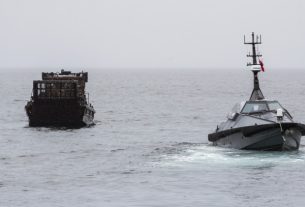The GPS, known primarily as a navigation tool, has evolved to become crucial for various non-navigational functions. Banks, for example, could depend on GPS systems to calculate distances and time intervals between transactions and detect unusual transaction patterns. Likewise, significant corporations could use GPS systems to coordinate computer networks and global activities efficiently.
But jamming or spoofing a GPS tied to an airplane or sea vessel can prove life-threatening, Unna said.
“Recently. I was traveling in the North near Nazareth, and from one point not far from Nazareth, the Waze was no longer relevant because it showed that I was at the airport in Beirut,” Unna told the Post. “Why was that? The reason is that somebody is jamming and spoofing the GPS in all the upper-north areas of Israel to avoid drones from Hezbollah or Syria that GPS navigates. This way, they cannot be navigated by GPS. Of course, the civilians suffer too.”
In 2018, when Unna was in his directorate role, he received a call from Haifa Port employees stating that they could not work because of “interference.”
He said, “I asked them if a cyber attack had occurred. They said they were not sure.”
Unna explained that the Syrian battlefield was much “hotter” at that time, and the country was using jamming and spoofing against various non-state actors. However, everything within a radius of dozens of miles from the battlefield was also being affected. This GPS tampering blocked the signals the sea port’s crane operators needed to locate and move goods.
“The interference was so strong that the seaport was out of service,” Unna said. “They could not work until they replaced the GPS with auxiliary systems that were not dependent on GPS.”
The situation cost the country a substantial amount of money.
Baltimore Bridge Collision: Could GPS Jamming be at Play?
Unna said the problem is only expected to become more acute, as seen last week in Eastern Europe.
He explained that the “biggest and most important name for commercial flights is redundancy.” For example, planes have two engines so that if one fails, you can still fly safely. The same is true for the GPS; there is an auxiliary system if the GPS fails. However, that is effective only if the pilot notices fast enough and can manage.
“If during take off the GPS suddenly goes berserk, a less trained pilot could panic or abort take off,” Unna said. “There have been cases where because of the GPS take off has been aborted in the middle, which is extremely dangerous.
“In busy airports, the distances between airplanes is minimal,” he continued. “If the GPS is spoofed to cause the plane to go even one or two degrees to the right or left, it may be too late when the pilot discovers that.”
The same is valid on the water.
Last week, the Francis Scott Key Bridge in Baltimore collapsed when a vast cargo ship exiting the city’s port struck it. The incident is still under investigation, but Unna said GPS jamming or spoofing could have been at play.
“In communications, it has been reported that the crew lost control of the ship,” Unna said. This could be the definition of a cyber attack: Someone got unauthorized control over the ship’s networks, and then the vessel ran very fast into the bridge. This is still under investigation, and there is nothing solid yet. But even if this was not a foul play or an adversary attack, it could have been.
“Imagine a big tank or cargo ship diverts [and runs] into one of the gas platforms in the Mediterranean,” Unna posited. “A terrorist group could take over a ship from a distance and cause catastrophic damage.”
Israeli Defense Technologies
Israel’s largest defense technology companies – Rafael, Elbit and the Israel Aerospace Industries – are all “mastering electronic warfare,” Unna said. However, several newer start-ups could prove extremely important in the space.
For example, he highlighted the company Cyviation, which offers a four-pronged platform for addressing communication vulnerabilities and cyber risks in the air. The company’s one-sheeter describes an aircraft-centric remote cyber assessment platform, airborne cyber attack detection and events management tools, pilot training and education, and cyber incident management support.
Unna is a member of Cyviation’s advisory board.
For the sea, Unna mentioned Cydome, which offers monitoring, protection and remote access control for maritime vessels.
Unna said that Jerusalem-based AccuBeat offers atomic clocks and oscillator solutions to replace the GPS. Atomic clocks use the resonance frequencies of atoms like cesium or rubidium to maintain exact timekeeping, offering a potential substitute or backup for GPS technology. The company says on its website that its “anti-jamming and anti-spoofing equipment and solutions ensure continuous operation even in a GPS/GNSS denied environment.”
“AccuBeat is one of the few companies of its kind in the world, and for a small, Israeli company, it is punching above its weight,” Unna told the Post. “Their clocks are of a military standard and can be used so that armies do not have to rely on the GPS as a timing element.”
Unna said that a panel on navigational warfare will be featured at Cybertech next month, and many international navies are expected to attend.
“Many navies are coming over from India and Europe to discuss this kind of thing,” Unna, who has advised on the event’s planning, said. “Navigational warfare is a growing threat, and the world is beginning to suffer from it.”



